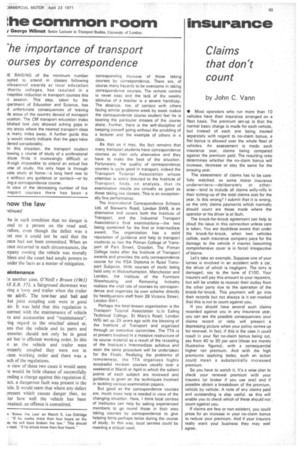he common room
Page 65

If you've noticed an error in this article please click here to report it so we can fix it.
George Wilmot Senior Lecturer in Transport Studies, University of London.
he importance of transport .ourses by correspondence
1E RAISING of the minimum number ti.ired to attend in classes following ofessional awards at local education thority colleges, has resulted in a rceptible reduction in transport courses this it session. This step, taken by the ipartment of Education and Science, has
d unfortunate consequences of leaving de areas of the country devoid of transport ucation. The CM transport education index blished last July showed aching gaps in my areas where the nearest transport class is many miles away. A further guide this ly would clearly indicate that the gaps have dened considerably.
In this situation, the transport student lowing a course of study of a professional ititute finds it increasingly difficult or !II-nigh impossible to attend an actual live urse of study. His only hope is through vete study at home—a long hard row to e without any guidance or contact—or by :ing a correspondence course.
In view of the decreasing number of live insport courses there has been a corresponding increase of those taking courses by correspondence. There are, of course many hazards to be overcome in taking correspondence courses. The remote control is never easy and the tack of the weekly stimulus of a teacher is a severe handicap. The absence, too, of contact with others facing similar problems week by week makes the correspondence course student feel he is bearing the particular crosses of the course alone. Further, there is the self-discipline of keeping oneself going without the prodding of a lecturer and the example of others in a class.
Be that as it may, the fact remains that many transport students have correspondence courses as their only alternative and they have to make the best of the situation. Fortunately, the quality of correspondence courses is quite good in transport, indeed the Transport Tutorial Association whose attention is solely directed to the Institute of Transport, finds, on analysis, that its examination results are virtually as good as those taking live classes. This is an exceptionally fine performance.
The International Correspondence Schools Ltd. of Stewarts Road, London SW8, is an alternative and covers both the Institute of Transport, and the Industrial Transport Association's final examinations—the two being combined for the first or Intermediate award. The organization has a solid reputation of guidance and help to transport students as has the Pitman College of Transport of Park Street, Croydon. The Pitman College looks after the Institute of Transport awards and provides the only correspondence course for the RSA Diploma in Road Transport Subjects. With courses of study being held only in Wolverhampton, Manchester and London, the Institute of the Furniture Warehousing and Removing Industry realizes the vital role of courses by correspondence and organizes its own scheme directly by headquarters staff from 39 Victoria Street, London SW1.
Perhaps the best-known organization is the Transport Tutorial Association (c/o Ealing Technical College, St Mary's Road, London W5) set up 25 years ago with the blessing of the Institute of Transport and organized through an executive committee. The TTA is at present involved in a massive restructure of its course material as a result of the recasting of the Institute's Intermediate syllabus and soon the same procedure will be undertaken for the Finals. Realizing the problems of remoteness, the TTA organizes highly successful revision courses usually over a weekend in March or April in which the salient points of each subject are reviewed and guidance is given on the techniques involved in tackling various examination papers.
But good as the correspondence courses are, much more help is needed in view of the changing situation. Here, I think local centres of institutes can help by asking experienced members to go round those in their area taking courses by correspondence to give helping hints perhaps twice during the course of study. In this way, local centres could be meeting a critical need.




























































































































